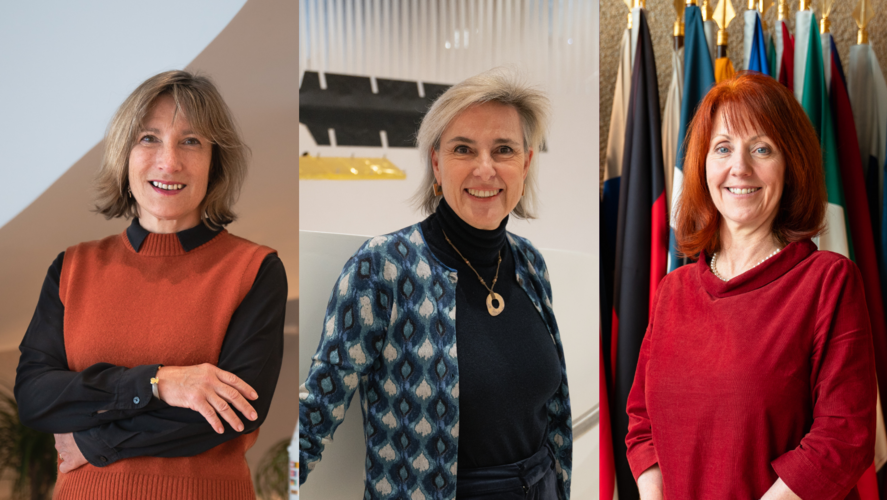Carole Mundell

Q. Tell us about your role as Director of Science at ESA
I have the privilege to lead the ESA Science Directorate and, as such, I am also Head of Establishment at ESA’s European Space Astronomy Centre, near Madrid – the ESA home of science – and where I act as the Director General’s diplomatic representative in Spain. I have staff in five different countries, including the United States, and it is a leadership and management role that covers a very broad portfolio.
The Science Directorate collaborates with Member States and with our international partners to explore fundamental questions about the Universe. We achieve this by developing cutting-edge technologies for spacecraft missions that venture beyond Earth's orbit. Our missions range from studying neighbouring planets such as Mars and Venus to exploring distant stars, galaxies and black holes at the edge of the observable Universe. We also delve into the earliest moments of the Universe, probing space-time and the governing laws of physics. Our dynamic programme not only pioneers advancements in science and technology, but also facilitates technology transfer for future missions. Recognising the importance of data from our missions, we actively preserve and innovate in digital platforms, making legacy data valuable for future generations. By fostering engagement with scientists and citizens, we encourage innovative approaches, such as machine learning and artificial intelligence, to extract unforeseen insights from our mission data. The continuous evolution of our efforts reflects our commitment to ESA's role in addressing the STEM skills gap and maintaining European leadership in space exploration.
Q. Can you provide an overview of the current Science Programme strategy, Cosmic Vision, and its major milestones and missions?
The final missions of the Cosmic Visions programme encompass science from studies of the Solar System to gravitational waves. This year, we launched the L1 mission Juice to study the icy moons of Jupiter, the wider jovian system and to search for signatures of habitability in the liquid oceans we believe exist beneath the icy crusts. We also launched the incredible Euclid mission to study the ‘dark Universe’, to understand the nature of dark matter and dark energy by surveying one third of the sky back to 10 billion years ago with exquisite precision. Missions in development include Plato and Ariel, which will study exoplanets beyond our Solar System and, for the first time, give us unprecedented insights into the properties of exoplanet atmospheric chemistry! Comet Interceptor, to be launched in tandem with Ariel, will loiter in space for two to three years, then chase and study a comet – sounds almost like science fiction! And we are going through the mission adoption reviews at the moment for our ground-breaking Venus mission, Envision, and the three-spacecraft LISA mission which will enable us to probe ripples in space-time caused by the catastrophic merger of supermassive black holes – whilst pushing our spaceflight skills to the limit! In parallel, we are currently reviewing the viability of the ‘New Athena’ X-ray mission, which seeks to study high-energy radiation from very hot X-ray emitting plasmas in extreme places in the cosmos such as close to black holes and in massive galaxy clusters. This is just a flavour of the work led by our directorate.
Q. How do you see the transition from the current Cosmic Vision program to the upcoming Voyage 2050?
When planning Voyage 2050, we asked the science community for their ideas, and we got a lot of them! We carefully went through all these ideas and grouped them into three main themes for big missions: (1) Moons of the giant planets, (2) From temperate exoplanets to the Milky Way, and (3) New physical probes of the early Universe. Voyage 2050 also focuses on important new technologies for the next century, such as cold atom interferometry for atomic clock development, enabling X-ray interferometry for the future study of compact objects like black holes, and developments for future planetary missions: in particular better power sources to enable the exploration of the outer Solar System, and advances in collecting and storing cryogenic samples of cometary ices for the search for life in the outer Solar System.
Q. Can you recall a life experience that has played a significant role in shaping the person you have become, and in what ways?
Working as Chief Scientific Adviser in the UK Foreign, Commonwealth and Development Office (Foreign Ministry) was life changing. Seeing the real-world impact of robust, trustworthy science evidence and the power of international collaboration at a time of global crisis gives me hope in this conflicted world.
Q. Who is a woman for whom you have a lot of admiration?
There are many women and men from whom I have learned and taken inspiration – and continue to do so. I have been particularly inspired by the courage of my younger women colleagues who are driving change and challenging the status quo.
Q. How can we, ESA, promote positive change with respect to gender equality?
We have a wide range of initiatives but, in my opinion, fundamental is the need for respectful behaviour in the workplace - tackling behaviours that exclude, belittle or intimidate and challenging gendered stereotypes. I think the ‘Active bystander’ training is an excellent step to enable us all to have the practical tools and empathy to drive this positive change.



